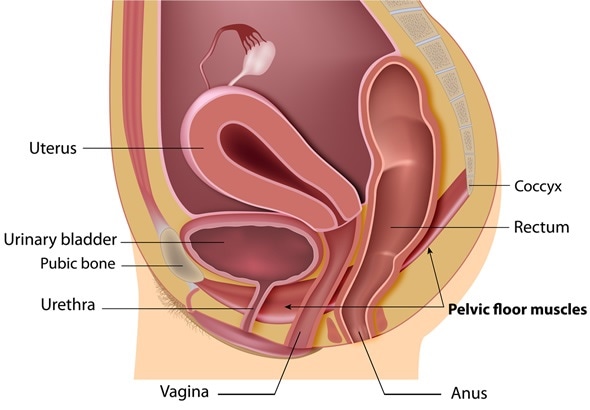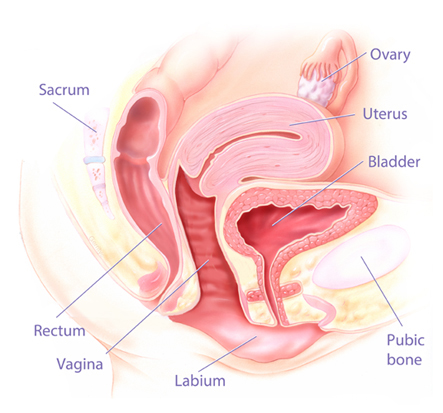Let’s talk about prolapse
Pelvic organ prolapse can be a little embarrassing to talk about but it is estimated that over half of all Australian women who have given birth experience it to some level.
What exactly is prolapse?
Prolapse is a gynaecological issue where the muscles and ligaments in the pelvic floor become weak or damaged. These muscles support all of the key pelvic organs (the bladder, uterus, large intestine, and rectum),
 holding them in their place above the vaginal wall. When these muscles are damaged or weaken, one or more of the organs may drop down and protrude into the vaginal wall. Many women don’t feel comfortable discussing it but this common issue can actually cause quite significant discomfort, and impact on your ability to enjoy day-to-day life to the fullest.
holding them in their place above the vaginal wall. When these muscles are damaged or weaken, one or more of the organs may drop down and protrude into the vaginal wall. Many women don’t feel comfortable discussing it but this common issue can actually cause quite significant discomfort, and impact on your ability to enjoy day-to-day life to the fullest.
What causes prolapse?
Unsurprisingly, pregnancy and childbirth place quite a strain on the pelvic floor muscles. That is why prolapse is so common in women who have given birth. Vaginal birth, forceps delivery and large or heavy babies also increase the risk of pelvic organ prolapse.
That doesn’t meant that childbirth is the only cause of pelvic organ prolapse. Menopause, aging, constipation, being overweight and chronic coughing all increase risk of injury to the pelvic supporting tissue. Prolapse can also affect women who have never had children. Basically, anything that puts significant and sustained pressure on a woman’s pelvic floor muscles can increase the risk of prolapse.
What are the symptoms of genital prolapse?
Depending on the affected organ, the symptoms of prolapse may present differently. Some of the most commonly reported symptoms are:
- Pressure or pain in the pelvic region, there may be even lump or protrusion from the vagina
- Painful sex
- Difficulty urinating or incontinence
- Constipation or other difficulties with bowel movements
- Irritation and bleeding
How does a gynaecologist diagnose and treat pelvic organ prolapse?
Prolapse is generally quite straightforward to diagnose. Your gynaecologist will conduct a physical exam and will be able to physically measure the severity of your prolapse. Prolapse may also be able to be identified during a regular pap smear. Once your gynaecologist has ascertained the degree of your prolapse, they will be able to advise what treatment options may be available.
In less severe cases, recommended treatment is likely to be non-surgical and may include:
- Physiotherapy – like other muscle or ligament injuries, training may be possible to re-strengthen the pelvic floor.
- Lifestyle changes – this may be an option if your prolapse is caused by a lifestyle factor. Adjustments like changing your diet, changing your exercise regime and losing weight may help.
- Support aids – a rubber prosthetic device known as a vaginal pessary can be fitted inside the vagina to help support the walls.
Surgical options
There are multiple different surgical approaches that may be available if your prolapse is more severe. Generally they will fall under the category of a vaginal approach or an abdominal approach.
- Vaginal approach – this is performed through the vagina and involves separating the pelvic organ that are impacted from the vaginal wall and then using stitches to reinforce and repair the walls.
- Abdominal approach – this is performed through the abdomen and involves using sutures or grafts to create support inside the pelvis.
Can I prevent prolapse?
There is no proven way to prevent prolapse at this point in time. However, you can reduce your risk of prolapse by maintaining a healthy weight, looking after your gut health to minimise strain in your bowel movements, and avoiding smoking which can cause chronic coughing.
If you are pregnant, speak to your OBGYN about how you may be able to minimise your risk of prolapse before childbirth. They may be able to recommend exercises to help strengthen or refer you to a physiotherapist or antenatal classes that can help.
If you are living with the discomfort or pain associated with prolapse, Dr Jabbour is an experienced gynaecologist based in Sunnybank, Brisbane who can help you explore your options for treatment and management of your symptoms.

Dr Joseph Jabbour is a gynaecology specialist who offers caring and professional medical advice for the diagnosis, management, and treatment of all kinds of female reproductive issues such as prolapse. He takes an evidence-based approach and is passionate about ensuring his patients are well-informed and empowered to make the best decisions for their health.
He is also practised in minor gynaecological procedures and can perform surgery for the treatment of prolapse in Brisbane.



